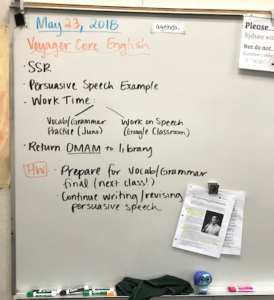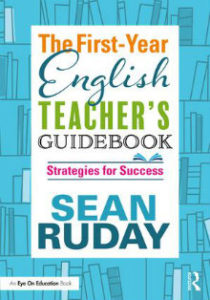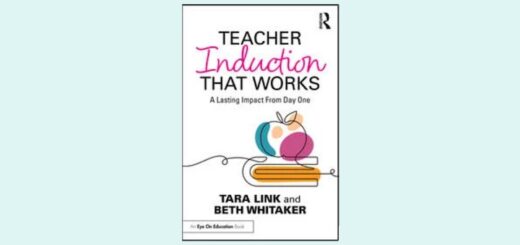4 Ideas Help New ELA Teachers Start Strong
By Sean Ruday
 In the musical Hamilton, George Washington explains to Alexander Hamilton, “Let me tell you what I wish I’d known when I was young and dreamed of glory….” I recently reflected on this idea when creating recommendations to help first-year English teachers be successful during this important and challenging time in their careers.
In the musical Hamilton, George Washington explains to Alexander Hamilton, “Let me tell you what I wish I’d known when I was young and dreamed of glory….” I recently reflected on this idea when creating recommendations to help first-year English teachers be successful during this important and challenging time in their careers.
Inspired by Washington’s statement, I asked myself three questions:
(1) “What do I wish I had known before my first year teaching middle school English?” (I began my career as an English teacher in 2004, teaching middle school English in New York City public schools).
(2) “According to research, what maximizes the success of first-year English teachers?”
(3) “What are the key pieces of advice I would give first-year English teachers?”
After I reflected on these questions, examined the research on the topic, and talked with teachers and administrators, I created four recommendations that can help new English teachers’ first years in the classroom be as successful as possible. I hope beginning teachers, mentors, and other teacher educators find them useful.
1. Practices That Impact Student Learning and Behavior
Some people think that teachers need to be tough and intimidating to have effectively managed classrooms, but a well-organized and clearly structured learning environment is really what leads to strong classroom management. I’ve identified three components of effective lessons that lead to strong classroom management: clear organization, a strong sense of pace, and a thorough plan.

A lesson with all of these components is going to provide students with structure, keep them engaged, and ensure that they’ll be on task for the duration of the class period. First-year teachers who include these features in their lessons will maximize the effectiveness of their classroom management.
2. The Key to Thoughtful, High-Quality Decisions
Teachers consistently hear about new instructional strategies and ideas: some of these will enhance instruction, while others will not. This can be especially overwhelming for new teachers who don’t have much experience from which to draw when making decisions on instructional methods.

These questions can help teachers of all experience levels, but are especially useful for first-year teachers who might feel overwhelmed by potential options and strategies. For example, there are a number of ways to integrate technology into instruction – some have the potential to enhance teaching and learning, while others may not be good investments of time. Evaluating tech activities using these reflection questions can help new teachers be sure they are making strong decisions for themselves and their students.
3. Focused Feedback = Student Success & Teacher Sanity
English teachers spend a lot of time responding to student writing, a potential cause of burnout among new teachers who struggle with this responsibility. I recommend that first-year teachers counter this potential pitfall by keeping their comments and reactions as clear and focused as possible.
Some English teachers look at a piece of student writing and want to fix it in every way possible; while this approach may be guided by good intentions, it isn’t useful for the students or the teacher. The most useful feedback makes specific suggestions for improvement that are relevant to what students understand and also provide students with some concrete praise.
Concrete and specific responses will not only give students clear direction about what they should work on and what they’re already doing well, but also will allow teachers to use their grading time more effectively and efficiently, guarding against feeling overwhelmed and burned out by the demands of grading early in one’s career.
4. Balance is Essential to Success
My final recommendation is for first-year English teachers to find a sense of balance in their professional and personal lives by employing three key tactics: communicating actively with students and families, working effectively with mentors, and making time for self-care.
Communication methods such as family newsletters, student agendas, and classroom websites give students the tools they need to be responsible for their learning, reducing the need for teachers to constantly answer clarification questions.
Working with mentors is another way to facilitate new teachers’ success and work-life balance. Mentors can help first-year teachers feel like part of a community, give instructional ideas, and help provide time-management advice. When communicating with mentors, it’s important that new teachers express their needs clearly to be sure they’re getting suggestions that are useful to them. New teachers should also reserve the right to consider the information they receive before acting on it to ensure that it’s aligned with their instructional goals and students’ needs.
Finally, I strongly recommend that new teachers take time for self-care, such as exercise, meditation, and social time—doing so can increase one’s ability to deal with stressful situations in the classroom and guard against feeling burned out. (See these self-care tips.)
As You Launch Your Journey
I want to close by congratulating new English teachers on choosing such an important career. I hope that the ideas described here can help you navigate this journey. As George Washington asserts in Hamilton, “Greatness lies in you.” If you have any questions – or if there is any other information I can provide – please don’t hesitate to reach out. I can be reached at sean.ruday@gmail.com and @SeanRuday on Twitter.































